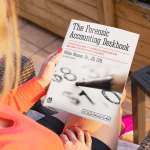Forensic Accountants Uncover Income Manipulation in Divorce
Can a forensic accountant find hidden bank accounts? Income manipulation usually starts with the tax return. Compare that with other financial documents. A lower documented income generally helps with lowering child support and spousal support.

The Forensic Accounting Deskbook by Miles Mason, Sr. JD, CPA, published by the ABA Family Law Section
Miles Mason, Sr. JD, CPA is the author of The Forensic Accounting Deskbook: A Practical Guide to Financial Investigation and Analysis for Family Lawyers, Second Edition, published by the ABA Family Law Section. This updated edition of one the ABA’s most popular resources explains the practice of forensic accounting and business valuation and how to apply it in family law cases. It provides a practice-focused introduction to the core financial concepts in divorce, such as asset identification, classification, and valuation, income determination, expenses, and more.
See Mason’s complete list of the 10 Big Divorce Financial Mistakes.
VIDEO TRANSCRIPT:
Tracy Coenen: We talked earlier about calculating income for purposes of child support or alimony. How important is an accurate calculation of income for these things?
Miles Mason: Oh, it’s huge. Because, remember, if you depress the income and the income, the claimed income, for the divorce purposes, it’s used both in the child support and alimony determination. You really get a twofer. If you include lower taxes and if you’re committing income tax fraud, then you really get three benefits from it. But for child support, it can make a huge impact, especially in the life of the supported spouse. By reducing your ability to pay or reducing the supporting spouse’s ability to pay can again have a huge impact and materially alter the outcome of a divorce.
Tracy Coenen: But what if a husband’s income is, let’s say, only a few thousand dollars more than what he’s reporting? Is that really going to make a big difference?
Miles Mason: Well, like anything else, if it’s significant, can it be proven to be intentional? One of the things that we see with manipulation of financial statements, you manipulate a couple of percent here, 2, 3% there, maybe 5% here, and maybe another 2 or 3, next thing you know, you’re talking about real money. It’s not that hard to move 15, 20, 30%. In any one particular manipulation, you say, “Well, the CPA did it. I didn’t make that adjustment. Somebody else did.”
But at the end of the day, what is weighed against, why wouldn’t everybody manipulate their income? Why wouldn’t everybody manipulate the financial statements and income when they get such a benefit? Well, the answer is if it’s shown in the courtroom to be a manipulation, to be a lie, to be an omission, to be in a place where the judge loses the belief that that spouse is credible, that could devastate a case.
Depending on the size of the estate, of course, we’re going to talk about relatively, a few hundred dollars per month may, in any particular case, may make a huge difference in support and make the difference whether somebody’s winning a divorce or, depending on the size, it may not make a big difference at all. It just depends.
Tracy Coenen: Are attorneys pretty good at raising issues related to manipulation of income?
Miles Mason: It depends. What I see more often is that the clients drive this issue. They know when somebody is under reporting their income. They know when their husband or wife has just gone out and bought a new luxury car. As the divorce lawyer, I’m kind of getting my information secondhand. I represented a business owner that went out and bought an S500 Mercedes, on a hundred percent borrowed money, with a $2,000 a month car payment, within 45 days of the filing of divorce. That’s my client. Well, of course, the other side’s going to say that my client is hiding money because of the Mercedes. It’s very often the client that comes and drives it. So I think that lawyers should be more active on these issues. The more often that they bring in a forensic accountant who can help them spot these issues, the better.
Thank you to Tracy Coenen, CPA, CFF for inviting me to join her in this video series. Tracy is a nationally recognized forensic accountant practicing in Milwaukee and Chicago.









